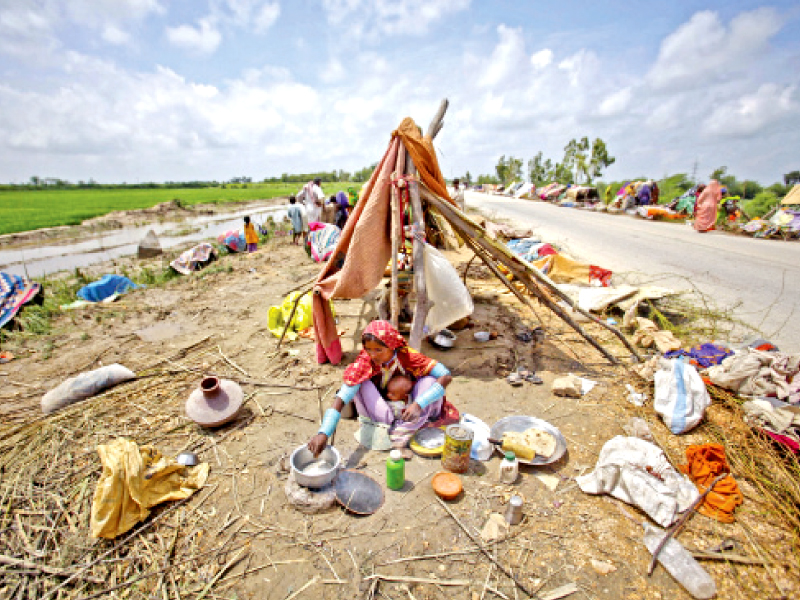
Imagine yourself as a woman subjected to domestic violence. Or forced conversion. Or abuse - of any kind.
You are vulnerable, battered and tired. Yet, you manage to escape. Then, in Sindh, you will likely have nowhere to go. Because here, shelter homes are few and rare.
The province, with a population of 47.88m, has only four government shelter houses for women, one in each Karachi, Hyderabad, Sukkur and Larkana. Of these, the one in Karachi is managed by a non-governmental organisation.
So when a woman faces violence or is subjected to forced conversion in Thar's Chachro taluka, she often has to travel for 200 kilometres to the shelter home in Hyderabad, a women rights activist advocate Hajani Lanjo told The Express Tribune.
"There is no [government-run] shelter home in Mithi, Umerkot, and even Mirpurkhas," said Lanjo.
Big plans, little work
It has been years since the government came up with the plan to set up more shelter homes. And after so many years and even more promises, the plan remains to be materialised.
Read more: Karachi’s Hindus homeless in their homeland
According to sources in the Social Welfare Department (SWD), who requested anonymity, between 2010 and 2011, a plan was conceived to set up shelter homes in Mirpurkhas, Shaheed Benazirabad, Jacobabad, Khairpur and other areas.
Millions of rupees were allocated for the purpose, but even after around a decade, the scheme hangs in the balance, the sources said.
A senior official of the department stated that the government had come up with a plan to convert Darul Amans to centres to house women facing violence.
The centres were conceived to provide police and prosecution assistance, legal aid, medico-legal services, counselling and rehabilitation services under one roof, he said, adding that Rs89 million was earmarked in 2010-11 to build the centres in Mirpurkhas and Jacobabad.
"Work is still in progress on the centres," the official said.
According to the official, another Rs13m was allocated for the construction of a Darul Aman in Khairpur and that centre too is yet to see the light of day.
Besides, a Darul Aman, housed in a multi-storey building with 21 rooms, was planned in Shaheed Benazirabad. The building is there, but the idea of it housing a Darul Aman remains a distant dream.
"It is a wonderful building, but there is a shortage of staff, which has delayed matters," a man who identified himself as Jahangir Jamali, the administration clerk at the Darul Aman, told The Express Tribune on phone.
He said just five to six staff, including clerks, peons and security personnel were hired and the Darul Aman could only be made functional after all the required staff was hired.
Jamali said the hiring of female and other staff had been pending for the past seven years, however, adding that the district administration had allocated two rooms in the building to accommodate women on a temporary basis before shifting them to another shelter home elsewhere.
When asked about the matter, SWD director general Abbas Detho said since there was restriction on making new appointments, they had not been able to hire staff for the shelter home.
He added that work on shelter homes in Jacobabad and Mirpurkhas was under way and it was expected that it would reach completion by the end of this year.
Head count
Nevertheless, some have been able to seek shelter in one of the four government-run shelters in Sindh.
According to official data, presently, 85 women are housed in the shelter home in Sukkur, 60 in the one located in Larkana and 20 in Hyderabad's shelter home.
Data for the shelter house in Karachi couldn't be obtained despite multiple attempts.
'In bad shape'
An official of the SWD told The Express Tribune on the condition of anonymity that while three of the shelter homes were in good condition, the one in Sukkur was in a bad shape.
"Its building is congested and there are hygiene issues," he said, adding that standard operating procedures were also ignored there. He outlined the lack of staff, not having the capacity to deal with the women accommodated in the shelter home and insufficient budget as major issues that hampered the smooth running and proper maintenance of the facility.
He further claimed that food served there was also unhygienic.
According to budget documents, more than 34m was allocated by the SWD for the dietary needs of persons in 18 rehabilitation centres, four Darul Amans and three Darul Atfals of Sindh in the fiscal year 2018-19.
When asked about unhygienic food and lack of facilities at Darul Amans, Detho refuted the reports.
"We have set up wonderful kitchens and women living there [in Darul Amans] cook meals themselves," he said, adding that they had started vocational training and different short courses for women at shelter homes as well. In addition, he said, we provide women counseling and legal aid too.
He further stated that someone from the Women Development Department (WDD) would be able to give a better picture of the situation as in a recent development, the Sindh, Services and General Administration Department had issued a notification, amending the title of 'Darul Amans' to 'Darul Amans and safe houses', and placing them under the authority of the WDD.
However, Sindh Women Development Minister Shehla Raza remained unavailable to comment on the matter despite multiple attempts to approach her.
Published in The Express Tribune, March 18th, 2021.


















COMMENTS
Comments are moderated and generally will be posted if they are on-topic and not abusive.
For more information, please see our Comments FAQ